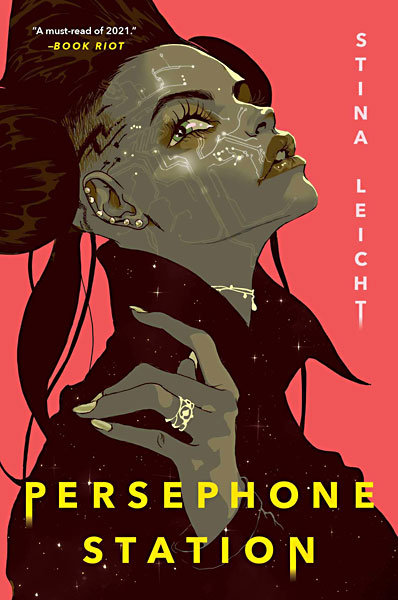Persephone Station Recasts the Magnificent Seven as Women in Space
Austin author Stina Leicht pens a rip-roaring mix of planetary intrigue, intergalactic adventure, and righteous sisterhood
By Mike Berry, Fri., Feb. 5, 2021
Austin writer Stina Leicht isn't afraid to take big leaps with her fiction, from Northern Ireland to an alternate America to the far reaches of space.
Her first two novels combined angels, figures out of Celtic folklore, and characters caught up in Northern Ireland's Troubles. Two door-stopping volumes of high fantasy, The Malorum Gates, followed just as the George R.R. Martin surge was about to peak. Now, Leicht has delivered a novel markedly different from her others. Persephone Station is a feminist space opera rooted in the traditions of the cinematic American Western, with a dusting of cyberpunk on top.
Born in St. Louis and raised in Houston, Leicht began writing after losing her job in the burst of the dot-com bubble around 2001. "I started writing to keep myself sane," she says in a telephone interview.
Leicht began establishing herself in the Austin science fiction scene after a cancer diagnosis made her take her writing ambitions more seriously. "I always wanted to be a writer. It was the thing I was going to deeply regret not giving a shot."
Leicht became involved with Austin's ArmadilloCon, where she led writers' workshops for many years. Persistence led to short stories nominated for awards and the publication of her first novel, Of Blood and Honey, in 2011.
A decade later comes Persephone Station, a rip-roaring mix of planetary intrigue, intergalactic adventure, and righteous sisterhood. The novel is set initially in West Brynner, a seemingly backwater town on a planet ignored by the United Republic of Planets but frequented by assassins, smugglers, and thieves of all sorts. Many ne'er-do-wells congregate in the back room of Monk's Bar to conduct nefarious business – chief among them the owner Rosie, ex-Marine Angel, Enid the inscrutable sharpshooter, and Lou, the earthy pilot of the ship Kurosawa.
The set-up seems a little familiar, until you realize the characters in positions of power are all women or nonbinary. "I've always wanted to write science fiction, but it's kind of a boys' club," Leicht says. "Largely because so many men are so interested in that distinction between 'hard' science fiction and 'soft' science fiction. The whole prospect was very intimidating."
Leicht said she was inspired to write Persephone Station while watching the latest film version of The Magnificent Seven. directed by Antoine Fuqua and starring Denzel Washington, Chris Pratt, and Ethan Hawke. "I was very excited to see what I thought would be a more diverse cast. But once again, there were absolutely no women in it who do anything of significance."
Leicht channeled her disappointment into a novel of her own. "I thought, wouldn't it be neat to write something that focused entirely on women and other genders that weren't male?"
Itself a reworking of Akira Kurosawa's Seven Samurai, Leicht's book features six women of color and one mostly silent white woman. Instead of rescuing terrorized townspeople, Angel and teammates come to the aid of the Emissaries, indigenous nonhumans who communicate through scent. No one is supposed to know about the Emissaries, but the Serrao-Orlov Corporation wants to exploit them. The Emissaries are pacifists, so they hire Angel and crew to do the dirty work for them.
"The Emissaries are basically a metaphor for how women go through life in Western society," Leicht says. "We're expected to transform ourselves into whatever it is that men want. The Emissaries are shapeshifters. They're ultimately passive-aggressive. They say that they are nonviolent, but they do subtly violent things."
Leicht says she believes that women's relationships with violence are much different from men's. "I've been a student of martial arts for quite a few years and every time I see a woman come to martial arts for the first time, she's very hesitant to actually hit someone. It's because we're very much trained not to do so."
Although Persephone Station delivers plenty of action, suspense, snappy dialogue, and plot twists, it is distinguished by the diversity of its characters and the different types of relationships they build among one another. Angel's best friend Sukyi, for example, fits a role usually reserved for male figures: the trickster god. (Think Coyote or Loki or the Monkey King.) Sukyi stands in stark contrast to mysterious, unflappable newcomer Kennedy Liu, who starts on the periphery of the story but eventually becomes central to the narrative, despite Sukyi's suspicions of her.
Don't expect any torrid love scenes in Persephone Station, though. "Most of the time, when women are involved in stories, there's a romance at some point," Leicht says. "Or sex. Always. But men can have stories and do anything, and nobody even questions it. That's why I wanted that novel to be the way it is."
The pandemic has reshaped Leicht's sales and promotion plans. Usually, she would expect to hold a signing at BookPeople, where she was a longtime employee in the teen section. She would also normally attend various conventions and talk about her books face-to-face. Such events are on hold for now, and Leicht is already at work on another science fiction novel, Loki's Ring. It's not a sequel to Persephone's Station, but it will feature an eclectic group of women working together as a team.
Leicht says, "It's hard as a white writer to learn how to depict people of other races and genders and sexualities. But that's your job as a science fiction writer. Science fiction is about 'other,' and we need to be able to be more inclusive.
"The future's for everybody," Leicht says.












